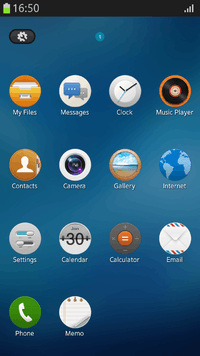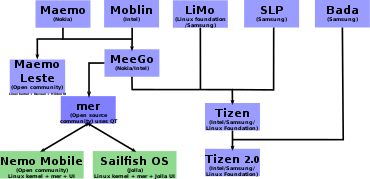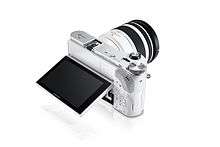Tizen
Tizen (/ˈtaɪzɛn/) is a Linux-based mobile operating system backed by the Linux Foundation but developed and used primarily by Samsung Electronics.
 | |
 Tizen 2.2 beta screen on a smartphone (2013)[1] | |
| Developer | Samsung Electronics |
|---|---|
| Written in | HTML5, C, C++ |
| OS family | Unix-like |
| Working state | Current |
| Source model | Open source with proprietary components |
| Initial release | January 5, 2012 |
| Latest release | 4.0.0.7 / September 27, 2019[2] |
| Latest preview | 5.5 M2[3] / November 27, 2019 |
| Repository | |
| Marketing target | Wearable computing, embedded systems, smartphones, |
| Package manager | RPM Package Manager |
| Platforms | ARM, ARM64 x86, and x86-64 |
| Kernel type | Monolithic (Linux) |
| Userland | GNU |
| Default user interface | Graphical (Native and Web applications), One UI for Smartwatch, TouchWiz for Smartphone |
| License | Operating system: GPLv2, LGPL, Apache License 2.0, BSD, Flora License SDK: Freeware |
| Official website | www |
The project was originally conceived as an HTML5-based platform for mobile devices to succeed MeeGo. Samsung merged its previous Linux-based OS effort, Bada, into Tizen, and has since used it primarily on platforms such as wearable devices and smart TVs.
Much of Tizen is open source software, although the software development kit contains proprietary components owned by Samsung, and portions of the OS are licensed under the Flora License, a derivative of the Apache License 2.0 that grants a patent license only to "Tizen certified platforms".
History

The Tizen project was formed by the Linux Foundation in 2011 as a successor to MeeGo, another Linux-based mobile operating system, with its main backer Intel joining Samsung Electronics, as well as Access Co., NEC Casio, NTT DoCoMo, Panasonic Mobile, SK Telecom, Telefónica, and Vodafone as commercial partners. Tizen would be designed to use HTML5 apps, and target mobile and embedded platforms such as netbooks, smartphones, tablets, smart TVs, and in-car entertainment systems.[4] U.S. carrier Sprint Corporation (who was a backer of MeeGo) joined the Tizen Association in May 2012.[5] On September 16, 2012, Automotive Grade Linux announced its intent to use Tizen as the basis of its reference distribution.[6]
In January 2013, Samsung announced its intent to release multiple Tizen-based phones that year. In February 2013, Samsung merged its Bada operating system into Tizen.[7][8]
In October 2013, the first Tizen tablet was shipped by Systena. The tablet was part of a development kit exclusive to Japan.[9][10][11]
In 2014, Samsung released the Gear 2 smartwatch that used a Tizen-based operating system as opposed to Android.[12]
On May 14, 2014, it was announced that Tizen would ship with Qt.[13] This project was abandoned in January 2017.[14]
On February 21, 2016, Samsung announced the Samsung Connect Auto, a connected car solution offering diagnostic, Wi-Fi, and other car-connected services. The device plugs directly into the OBD-II port underneath the steering wheel.[15]
On November 16, 2016, Samsung said they would be collaborating with Microsoft to bring .NET Core support to Tizen.[16]
According to Strategy Analytics research, approximately 21% of the smart TVs sold in 2018 run on the Tizen platform making it the most popular smart TV platform.[17]
Releases
Compatible devices
Smartwatch
.jpg)
Smartphone
- Samsung Z
- Samsung Z1
- Samsung Z2
- Samsung Z3
- Samsung Z4
Appliances
- Family Hub 3.0 Refrigerator[21]
LED Wall controllers
- SBB-SNOWJ3U[22]
Controversies
On April 3, 2017, Vice reported on its "Motherboard" website that Amihai Neiderman, an Israeli security expert, has found more than 40 zero-day vulnerabilities in Tizen's code, allowing hackers to remotely access a wide variety of current Samsung products running Tizen, such as Smart TVs and mobile phones.[23] After the article was published, Samsung, whom Neiderman tried to contact months before, reached out to him to inquire about his allegations.[23]
References
- "UI Overview | Tizen Developers". developer.tizen.org.
- "Notify Update". doc.samsungmobile.com.
- "Tizen 5.5 Public M2 Release | Tizen". www.tizen.org. Retrieved 2019-12-04.
- Ricker, Thomas (2011-09-28). "MeeGo is dead: Resurrected as Tizen, the newest Linux-based open source OS". The Verge. Retrieved 2019-01-21.
- Robertson, Adi (2012-05-07). "Sprint becomes first North American carrier to join Tizen Association". The Verge. Retrieved 2019-01-21.
- Best, Jo. "Tizen Linux heads for vehicles as car makers and tech firms form workgroup". ZDNet. Retrieved 2019-01-21.
- Byford, Sam (2013-02-25). "Samsung finally folding Bada OS into Tizen". The Verge. Retrieved 2019-01-21.
- Souppouris, Aaron (2013-01-03). "Samsung confirms it will launch multiple Tizen handsets this year". The Verge. Retrieved 2019-01-21.
- Brown, Eric (June 27, 2013). "World's first Tizen tablet?". LinuxGizmos.com. Archived from the original on July 2, 2013. Retrieved February 23, 2014.
- Brown, Eric (25 October 2013). "First Tizen tablet ships to developers". LinuxGizmos.com. Archived from the original on October 28, 2013. Retrieved February 23, 2014.
- Buckley, Sean (October 25, 2013). "First Tizen tablet launches in Japan, caters exclusively to developers". Engadget. Archived from the original on January 25, 2014. Retrieved February 23, 2014.
- Savov, Vlad (2014-02-22). "Samsung drops Android for Tizen in new Gear 2 smartwatches". The Verge. Retrieved 2019-01-21.
- "Tizen:Common to Ship with Qt Integrated". tizenexperts.com.
- "Tizen - Qt Wiki". wiki.qt.io.
- "Samsung Ushers in a New Era of Driving Experience with Samsung Connect Auto". February 21, 2016. Retrieved March 10, 2018.
- "Samsung announces .NET Core support and Visual Studio Tools for Tizen OS". MSPoweruser. November 16, 2016.
- "Samsung's Tizen OS dominates global smart TV market". March 25, 2019. Retrieved August 23, 2019.
- "Tizen 1.0 Larkspur SDK and Source Code Release". Tizen.org. Retrieved November 22, 2012.
- "Tizen 2.0 Magnolia SDK and Source Code Release". Tizen.org. Retrieved February 19, 2013.
- "Tizen 3.0 Milestones | Tizen Source". source.tizen.org.
- "Side-by-Side Refrigerator with Family Hub (RS27T5561SR) | Samsung US". Samsung Electronics America. Retrieved 2020-06-25.
- "accessories | SBB-SNOWJ3U | Samsung Display Solutions". displaysolutions.samsung.com. Retrieved 2019-10-31.
- Zetter, Kim (April 3, 2017). "Samsung's Android Replacement Is a Hacker's Dream". Motherboard. Retrieved 2020-06-30.
External links
| Wikimedia Commons has media related to Tizen. |
- Official website

- Comprehensive list of Tizen devices – detailed and incomplete list of devices that run Tizen
